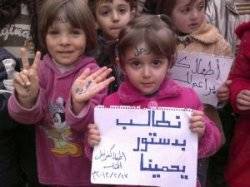Syrian activists have reported the deaths of more than 125 people across the country, just hours after state television announced that an overwhelming majority of voters had said "yes" to a new constitution.
In the besieged city of Homs, at least 64 bodies were reportedly recovered on Monday in a rural area between the villages of Ram al-Enz and Ghajariyeh.
Abou Baker from the troubled Bab Amr neighborhood said the bodies belonged to people who were kidnapped as they were trying to flee the area.
"Families leaving Bab Amr were stopped at a checkpoint last night and 62 were kidnapped. This morning their bodies were recovered in an area loyal to [President Bashar] al-Assad," he said.
Bab Amr is an opposition stronghold that has been under bombardment by government forces for more than three weeks.
The Local Co-ordination Committees (LCC), an umbrella opposition group, confirmed the deaths and said that 25 people were killed in separate incidents in the city.
Explosions were reported in the Homs neighborhoods of Hamidiyeh, Bustan al-Diwan and the city center.
"Homs is literally dying," Omar Shakir, an activist, told Al Jazeera.
"Only one hospital in Waar neighborhood remains functioning in the city. There is a severe shortage of medicine and medical supplies.
"Only two bakeries are struggling to provide Homs with bread. There are many hungry people."
In other parts of the country, the LCC said nine people were killed in the suburbs of Aleppo, 15 in the countryside of Idlib, four in the suburbs of Hama, four in the Damascus Suburbs, one in Damascus, one in Hasake, one in al-Raqqa and one in Deraa.
'Cynical referendum'
The latest reports of violence came as Syrian TV said on Monday that 57.4 per cent of eligible voters voted the day earlier, with 89.4 per cent saying "yes" and only nine per cent saying "no" to the referendum that Assad's opponents and Western nations have dismissed as a sham.
Victoria Nuland, US state department spokeswoman, asked how a democratic process could take place in the country while Syrian government guns and tanks were still firing.
"We dismiss it [the referendum] as absolutely cynical," Nuland told reporters on Monday.
The announcement of the results came just after the EU adopted sanctions on Syria’s central bank and froze the assets of several Syrian government officials.
The foreign ministers of the 27 EU countries, in a meeting in Brussels on Monday, also banned the purchase of gold, precious metals and diamonds from the country, and banned Syrian cargo flights from the EU.
The names of the Syrian officials sanctioned would be made public on Tuesday in the EU's official journal.
In another development on Monday, Qatar's prime minister said he was in favor of delivering arms to the Syrian opposition that is battling government forces.
"We should do whatever necessary to help them, including giving them weapons to defend themselves," Sheikh Hamad bin Jassim Al Thani said during an official visit to Norway.
"This uprising in Syria now [has lasted] one year. For 10 months, it was peaceful: nobody was carrying weapons, nobody was doing anything. And Bashar continued killing them.
"So I think they're right to defend themselves by weapons and I think we should help these people by all means."
Multiparty system
The approved constitution, framed by a committee of 29 people appointed by Assad, would drop the highly controversial Article 8 in the existing charter, which makes the Baath party "the head of state and society".
That would effectively end the monopoly on power the Baathists have enjoyed since they seized power in a 1963 coup that brought Assad's late father, Hafez, to power.
Under the new charter, the president would maintain his grip on broad powers, as he would still name the prime minister and government and, in some cases, could veto legislation.
Article 88 states that the president can be elected for two seven-year terms, but Article 155 says these conditions only take effect after the next election for a head of state, set for 2014.
This means that Assad could theoretically stay at the helm for another 16 years.
This is Syria's third referendum since Assad inherited power from his late father. The first installed him as president in 2000 with an official 97.2 per cent in favor.
The second renewed his term seven years later with 97.6 per cent in favor.
PHOTO CAPTION
Children take part in a protest against Syria's President Bashar al-Assad in Kafranbel, near Idlib, February 27, 2012.
Aljazeera


 Home
Home Discover Islam
Discover Islam Quran Recitations
Quran Recitations Lectures
Lectures
 Fatwa
Fatwa Articles
Articles Fiqh
Fiqh E-Books
E-Books Boys & Girls
Boys & Girls  Women
Women










